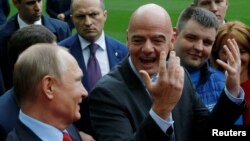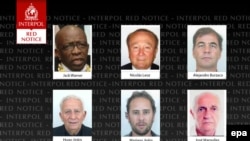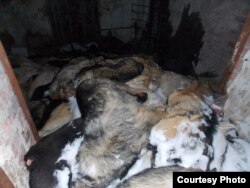Top officials of the International Federation of Football [Soccer] Association, or FIFA, have praised Russia’s preparations for hosting the 2018 World Cup this coming summer. FIFA’s president, Gianni Infantino, appeared in a promotional video, saying he is expecting a “great atmosphere” for games in Russia – where, he said, “everything is done for the fans.”
In December, President Vladimir Putin welcomed world soccer stars to the Kremlin for the 2018 World Cup final draw ceremony. “Our country intends to hold it at the highest level,” Putin said.
There are, however, issues overshadowing the idyllic picture drawn by Infantino and Putin. Even as Russian preparations for the 2018 World Cup in Russia continue, the "great atmosphere” is tarnished by ongoing and new scandal.
Corruption
With new allegations reported publicly this week, the United States Justice Department last month issued new grand jury subpoenas in an investigation of FIFA, the International Olympic Committee and the U.S. Olympic Commitee. The newest probe touches Russia's involvement in the Olympics. Among the specific sports marketing companies that prosecutors are scrutinizing is Helios Partners, a firm that has lobbied global sports officials to award high-profile events to particular cities and countries. Helios helped Russia secure the 2014 Winter Olympics and the coming 2018 World Cup, before its acquisition in 2012 by the Amaury Group, a French media company.
According to the Russian opposition party Yabloko, Russia has spent 212.5 billion rubles ($ 3.5 billion) on the construction or reconstruction of the eleven main arenas for the World Cup -- “almost 100 billion rubles [$1.6 billion] greater” than what other governments would have spent to do the same thing.
The Russian government has not released a list of the general contractors for these jobs, but it certainly consists “almost entirely of the friends and comrades in arms of Putin,” said Yabloko leader Sergey Mitrokhin. The difference between what the construction should have cost and what it did cost, he added, “almost certainly has ended up corruptly in their pockets.”
Accusations of Russia’s involvement in large-scale corruption surrounding soccer have been piling up since the U.S. indicted 14 top FIFA officials “who had corrupted the sport through two decades of shadowy dealing and $150 million in bribes.”
Following the U.S. indictments, the Office of the Attorney General of Switzerland opened a criminal investigation into how Russia was selected to host the 2018 World Cup. The investigation also includes the selection of Qatar for the 2022 competition.
The 2018 World Cup in Russia, as well as the next three competitions, is itself the target of yet another ongoing criminal probe – into an alleged a corruption scheme involving the allocation of media rights.
Cheating
The International Olympic Committee investigated mass doping schemes in Russian sports. As a result of that probe, Russia’s team was banned from participating in next month’s Winter Olympics in Pyeongchan, South Korea; 43 Russian athletes were disqualified from participating in Olympic events, while 13 were stripped of their Sochi Olympics’ medals [Russia, 2014]; and Russian Deputy Prime Minister Vitaly Mutko, the country’s former sports minister, was banned from the Olympics for life.
Mutko headed the 2018 World Cup organizing committee until stepping down last month due to the international pressure against FIFA.
However, Mutko’s “retirement” from soccer seems a mere formality: on January 24, a month after his “resignation” from the 2018 World Cup organizing committee, he announced that the World Cup infrastructure “must be ready” by April 1.
Thursday, the Louisiana based Court of Arbitration for Sport (CAS) -- Sport's highest tribunal, overturned the IOC ruling and reinstated the Sochi Olympics results for 28 Russian athletes, saying it had found insufficient evidence they were guilty of anti-doping violations in Sochi. Eleven others were confirmed by CAS to have committed doping violations.
However, CAS said its mandate was "not to determine generally whether there was an organized scheme allowing the manipulation of doping control samples … but was strictly limited to dealing with 39 individual cases and to assess the evidence applicable to each athlete on an individual basis."
Killing the Strays
In preparation for the World Cup, the Russian government has dedicated millions to “eliminating the public health threat” of stray animals.
According to the Facebook group @BloodyFIFA2018, stray dogs are being brutally killed in all 11 of the Russian cities set to host World Cup games.
Radio Free Europe/Radio Liberty reports that 6,000-8,000 rubles (roughly $107-$142) are being paid for each dog corpse is and dog extermination service companies are winning lucrative government contracts.
The situation is not without precedent: Thousands of stray animals were killed as part of the preparations for the 2014 Olympic Games in Sochi.
Worker Exploitation
In 2015, Marzuki Darusman, the United Nations human rights investigator for North Korea, launched a probe into the “slave-like” conditions for thousands of North Koreans working abroad, “mainly in China, Russia and the Middle East.”
The investigation found that North Korean workers were building stadiums in Russia for the 2018 World Cup. The Russian Foreign Ministry spokesperson called these allegations “fake,” and a Western plot aimed at “scaring off” foreign football fans.
Fan violence
The European soccer authority, UEFA, suspended Russia’s soccer team from Euro 2016 championships after Russian hooligans fought rival fans in the streets of host cities in France.
Vladimir Putin used the slang verb “otmetelit,” – roughly translated as “beat the hell out of” -- in commenting on the violence in France. "I don't know how 200 Russian fans could beat the hell out of a few thousands Brits,” he said.
Despite Russia’s pledge to ensure the country’s millions of soccer fans will behave, many believe football hooliganism remains a major safety concern for the 2018 World Cup in Russia.







